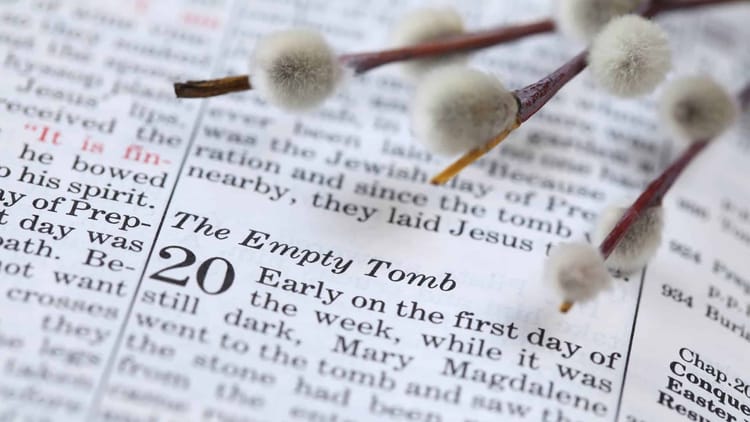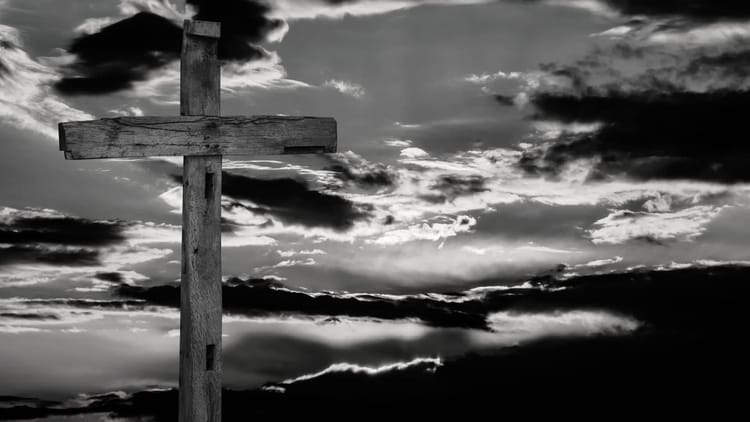How Easter Changes People (John 20:1-10)

This semester I’ve had the privilege of teaching some preaching students. The past couple of weeks they’ve preached. After they are done preaching, I get up and ask the other students, “What was the main idea, the one thing that the preacher was trying to say?” Sometimes they get it word for word. Other times they shrug their shoulders and look at each other. Sometimes I ask the preachers and they don’t know their big idea. Then you know we’re in real trouble.
Easter Sunday is too important to waste, so let me give you my big idea for the sake of clarity. As we look at this text, I want to take the next few minutes to say one thing. If you walk away this morning forgetting everything else I’ve said, I want you to get this: Unlikely and quirky people who don’t get it encounter Easter and are changed forever. Again: Unlikely and quirky people who don’t get it encounter Easter and are changed forever.Let me explain.
Unlikely and Quirky People
In the passage we have before us, we have three main characters. What I love about these characters is that they are so unlikely and so quirky. These are not heroic figures. These people are about as real as they get.
First, you have Mary Magdalene. She is the first person to see the empty tomb. This makes her the first witness of what happened on that Easter morning. She’s the most unlikely person for a couple of reasons. For one thing, she’s female at a time when people didn’t accept the testimony of women. In Israel no woman could be a witness in a court of law. A woman’s testimony was inadmissible and worthless. And yet in John 20 it is a woman who is entrusted with the most crucial testimony the world can ever hear.
But there’s something else that makes Mary Magdalene the most unlikely person to be a witness to what happens. In Luke 8 and Mark 16 we learn a little bit more about who she is. Luke 8:2 identifies her as “Mary, called Magdalene, from whom seven demons had gone out.” We don’t know much more about her, but this is enough to tell you that she had a past. Philip Yancey comments on the sharp contrast between how Jesus treated moral failures and how we his followers often do:
Jesus appointed the Samaritan woman as his first missionary. He defended the woman who anointed him with expensive perfume: “Wherever the gospel is preached throughout the world, what she has done will also be told, in memory of her.” And Mary Magdalene, she of the seven demons, he honored as the very first witness of the Resurrection—a testimony at first discounted by his more prestigious followers. Where we shame, he elevates.
So Mary’s the unlikely one, but then we have two quirky characters. In verses 4 to 10 you have the somewhat comical picture of two of the disciples who hear the report of the empty tomb and go to investigate. One is Peter. If you read the gospels, you understand a little about Peter’s character. He’s impetuous. He’s the first to open his mouth, even when he shouldn’t. In this passage you have him rushing to the tomb. He’s not as fast a runner as the other disciple, but when he catches up he doesn’t hesitate to go in and investigate. Then there’s the other disciple – probably John, who wrote this book – who gets there first but hesitates to go in, as you would probably do before you came to an open grave.
Here’s the picture you get. These are people who are completely unexpected, and somewhat quirky. The good news of Easter is that it’s for ordinary people in all of our ordinariness and in all of our quirkiness. It’s not for airbrushed and heroic people. It’s for people like Mary Magdalene, people like John and Peter, people like you and me. Easter is about unlikely and quirky people. 1 Corinthians 1:27 says, “But God chose what is foolish in the world to shame the wise.”But that’s not all. They’re not just unlikely and quirky.
Who Don’t Get It
They’re not just unlikely and quirky. They also don’t get it. This is great news for those of us who also don’t get it. All through his ministry, Jesus had predicted that he would die. He also predicted what would take place afterward. He predicted that he would rise again from the dead. We read, for instance, in John 2:Jesus answered them, “Destroy this temple, and in three days I will raise it up.” The Jews then said, “It has taken forty-six years to build this temple, and will you raise it up in three days?” But he was speaking about the temple of his body. When therefore he was raised from the dead, his disciples remembered that he had said this, and they believed the Scripture and the word that Jesus had spoken. (John 2:19-22)
If the disciples had understood, they would have been there waiting. But they didn’t understand. They didn’t get it. I think John is making this point even in how he introduces this chapter: “Now on the first day of the week…” Not “on the third day…” That would assume that we were keeping track, that we were counting down in anticipation of his resurrection. No, it’s the first day of the week. They show up not expecting anything but a dead body. They simply don’t get it.
You see this by the confusion that takes place. They seem at first to think that maybe a grave robber has been there. This wouldn’t have been completely surprising. Grave robbery was so common that the Emperor Claudius eventually ordered capital punishment for those convicted of destroying tombs, removing bodies, or even displacing the sealing stones. If you want proof that they didn’t get it, though, then you just have to look at verse 9: “for as yet they did not understand the Scripture, that he must rise from the dead.”
This is comforting for me. Have you ever been to a movie that’s so confusing that you can’t figure it out? You have to ask others all kinds of questions or go online when you get home to figure out what happened. I’ve seen a bunch of movies that seemed brilliant, and that I didn’t understand at all. It was like that in school as well. There were some subjects that I just got. There were other subjects that I just couldn’t get no matter how hard I tried.
It turns out that Easter is for those of us who just don’t get it. In Luke 24, Jesus said this to a couple of people who should have understood Easter but just didn’t get it: “O foolish ones, and slow of heart to believe all that the prophets have spoken!” (Luke 24:25). Easter is not for those who are spiritually advanced. The Gospel of John is telling us that it’s for people who don’t get it, people like you and me.
Remember that I only want you to remember one thing this morning. Let’s review so far and then add the next building block.
They Encounter Easter and are Changed Forever
We’ve already covered the first two parts of this: that this passage is about unlikely and quirky people who don’t get it. But this is the next part: they encounter Easter and are changed forever.It’s here that we see something that you have to face as you look at the biblical accounts of Easter. One biblical scholar notes that there is a pattern that takes place in all the resurrection narratives:
- The beneficiaries of the appearance are engulfed in a human emotion (Mary, grief; the disciples, fear; and Thomas, doubt).
- The risen Christ appears to them in the midst of their condition.
- As a result, their condition is transformed
We won’t look at the whole of chapter 20 this morning, but that’s exactly what happens here. These witnesses encounter an empty tomb. They’re befuddled. They don’t know how to account for what they discover. In particular, they account something that they can’t explain. Look at verses 6 and 7:
Then Simon Peter came, following him, and went into the tomb. He saw the linen cloths lying there, and the face cloth, which had been on Jesus’ head, not lying with the linen cloths but folded up in a place by itself.
It’s easy to explain an empty tomb: grave robbers. If that is all that happened, then we would not be celebrating Easter. But Mary Magdalene, Peter, and John did not just discover an empty tomb. They discovered the linen cloths that had been used to wrap Jesus’ body as they buried him. In John 11, when Jesus raised Lazarus from the dead, we read, “The man who had died came out, his hands and feet bound with linen strips, and his face wrapped with a cloth. Jesus said to them, ‘Unbind him, and let him go.’”
That’s not what happened with Jesus. Nobody had to unbind his burial clothes. It appears that he was able to pass through them with his resurrected body, just as he was able to later appear in a locked room in verse 19. Not only that, but the face cloth, which had been on Jesus’ head, was folded up by itself. Jesus had taken it off and folded it neatly, as if to say, “I won’t be needing this anymore.”You can account for an empty tomb. It’s very hard to account for graveclothes that have been left behind as if they’re not needed anymore. It’s even harder to account for Jesus’ appearing to the other disciples in the rest of this chapter.But even here in verse 8 you begin to sense the beginning of the change that’s taking place. “Then the other disciple, who had reached the tomb first, also went in, and he saw and believed.” What they encountered on Easter morning changed them, and changed them forever.
There are three facts about the resurrection that even critical scholars accept.
- The tomb in which Jesus was buried was discovered empty by a group of women on the Sunday following the crucifixion.
- Jesus’ disciples had real experiences with one whom they believed was the risen Christ.
- As a result of the preaching of these disciples, which had the resurrection at its center, the Christian church was established and grew.
In other words, even critical scholars accept that the disciples encountered something at Easter that changed them. These three things – the empty tomb, the encounters with the risen Christ, and the new boldness of the disciples, form a threefold strand of evidence. Matt Perman writes:
Virtually all scholars who deal with the resurrection, whatever their school of thought, assent to these three truths. We will see that the resurrection of Christ is the best explanation for each of them individually. But then we will see, even more significantly, that when these facts are taken together we have an even more powerful case for the resurrection–because the skeptic will not have to explain away just one historical fact, but three. These three truths create a strongly woven, three chord rope that cannot be broken.
It’s hard to describe how profoundly Easter changed these people. It changed everything about them. The rest of the New Testament is evidence of the effects of what happened on Easter morning.
Sometimes something happens that is so profound that it changes everything. Easter is that. The Big Bang Theory in science says that something happened 13.7 billion years ago that has continuing, profound effects today. This is as big a bang as anything scientists could imagine. The continuing effects of Easter still continue today. Ralph Stockman writes:
Something happened on Easter Day which made Christ more alive on the streets of Jerusalem forty days after his crucifixion than on the day of His Triumphal Entry. A false report might last forty days but the church which was founded on a Risen Christ has lasted for nineteen centuries, producing generations of the race’s finest characters.
So let’s put all of this together. Unlikely and quirky people who don’t get it encounter Easter and are changed forever. That’s the one thing I want you to take away today. We see this in the passage before us. But we also see it continuing today.
Application
Three things before we’re done:
First, if you’re an unlikely or quirky person, you may be here for a reason. Jesus seems to be drawn to those who aren’t what you’d expect. The good news of Easter is that Easter is for people like you. You don’t have to be heroic or spiritual. God chooses the most unlikely people, the people you would never expect.
Second, if you don’t get it, then you’re welcome as well. I love that there was no one waiting at the tomb expecting Jesus to rise. Even the women, who were last at the cross and first at the tomb, weren’t expecting Jesus to be raised. It reminds me of art class when I was in school. I did pretty well in school, but no matter how hard I tried, I couldn’t seem to draw. The only thing that I could eventually do is to give up. Easter is for people like this. You need to realize that Easter is not for those who are naturally at the top of the spiritual class. There’s nobody, actually, who is. Easter is for those of us who don’t get it, who are spiritual failures. Easter is for people like you and me.
Finally, Easter can change you. It’s been changing people throughout the centuries.
Once upon a time I had a young friend named Philip. Philip was born with Downs Syndrome. He wasn’t easily accepted by other children, but he went to Sunday school and attended the third-grade class.
The teacher idea for his class the Sunday after Easter. You know those things that pantyhose come in—the containers that look like great big eggs—my friend had collected ten of them. The children loved it when he brought them into the room. Each child was to get one. It was a beautiful spring day, and the assignment was for each child to go outside, find a symbol for new life, put it into the egg, and bring it back to the classroom. They would then open and share their new life symbols and surprises one by one.
The kids ran all around the church grounds, gathered their symbols, and returned to the classroom. They put all the eggs on a table, and then the teacher began to open them. All the children stood around the table. There was a flower. Then there was a butterfly. Then some kid – a joker – put in a rock just to be different. Eventually they opened one of the eggs and there was nothing. They were all confused. One of the kids said, “That’s not fair—that’s stupid!—somebody didn’t do right.”
The teacher felt a tug on his shirt, and he looked down. Philip was standing beside him. “It’s mine,” Philip said. “It’s mine.” And the children said, “You don’t ever do things right, Philip. There’s nothing there!” “I did so do it,” Philip said. “I did do it. It’s empty. The tomb is empty!”
There was silence, a very full silence. Philip got something that the rest of the kids didn’t. And when Phillip died, the kids remembered this empty egg and the empty tomb. At the funeral, nine eight-year-old children marched up to the altar, not with flowers to cover over the stark reality of death. Nine eight-year-olds, with their Sunday school teacher, marched right up to that altar, and laid on it an empty egg—an empty, old, discarded pantyhose egg.
Unlikely and quirky people who don’t get it encounter Easter and are changed forever – people like Philip, and people just like you and me.





